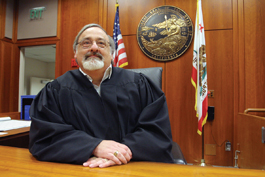home | metro silicon valley index | news | silicon valley | news article

BENCH PLAYER: Superior Court Judge Ray Cunningham has served as a Santa Clara County judge for almost 25 years, and will retire in August.
Judge Knot
With unusual rules and lots of restrictions, the race to replace Superior Court Judge Ray Cunningham could get complicated
By Vrinda Normand
SUPERIOR Court Judge Ray Cunningham will turn 60 this October amid the blissful relaxation of retirement. He has served on the Santa Clara County bench since 1984 and will be missed by many as the popular head of the courthouse's criminal division.
The seasoned judge gets to split a few months early, in August, because of unused vacation time—all those years of working on high-profile cases will finally pay off. You may remember reading about Cunningham in the press: last year he dismissed criminal charges against Patricia Dunn in the controversial Hewlett-Packard spying case.
Now a small posse of ambitious attorneys are vying to fill his shoes.
The two frontrunners are both prosecutors in the district attorney's office: Jay Boyarsky and Lane Liroff. Boyarsky's got a big headstart: an official campaign website growing with supporters and the coveted endorsement of Sheriff Laurie Smith.
"I'm really proud to have it," the candidate says. "I think it's like the biggest; her support is so important for a judicial race." While Boyarsky basks in his big endorse-ments (which also includes state Sen. Elaine Alquist), his rival Liroff says the race has only begun.
"Laurie's not the only endorsement or the one that makes or breaks the race," he says from his office. The 57-year-old prosecutor has juggled complicated homicide cases since 1985 and touts at least a decade more legal experience than Boyarsky.
"If you're going to go on an airplane ride, you'd like to know that the pilot has done this before," he adds. Liroff also taught at Lincoln Law School for 18 years (San Jose Councilmember Dave Cortese was his student), and he's gathered 29 endorsements from current and retired judges.
But insiders in this judicial election see weaknesses in both candidates. Boyarsky, critics say, looks like he's running away from the district attorney's office because he recently got pulled from a management position in Palo Alto. The former supporter of DA candidate Karyn Sinunu in now handling misdemeanor cases.
In his defense, Boyarsky tells us that he has "wanted to be a judge for a very long time."
Liroff also has issues that he'll need to address in his campaign. He's still carrying the 6-year-old murder case of police officer Jeff Fontana that could result in the death penalty for the defendant, deShawn Campbell. The prosecutor promised the victim's family another year as the case drags on, but he could delay the situation further if he becomes a judge in January 2009.
"They do need judges that know the law well," Liroff says.
Liroff and Boyarsky only have their résumés and endorsements to run on because ethical rules prevent them from taking a stand on the deeper issues. That's the tricky thing about trying to get elected as a judge—you're ultimately supposed to be a neutral arbitrator of the law, so you can't say how you would rule on any case or issue.
"Thank God I've never been on the ballot or had to seek endorsements," says Judge Katherine Gallagher. "It's a very, very sticky area. That's why some people say they're not taking any endorsements or money."
Judge Cunningham can't endorse any of the candidates vying to replace him because he sits on a local ethics committee that gives advice to judges. He says judicial candidates have to abide by the same "ethical canons" that sitting judges follow—even though they can't even put on a robe yet.
So that leaves the dissecting of resumes and battles about endorsers to decide the race. The latest news: Liroff got three more judicial backers from his poker group. Rest assured that both candidates will be keeping score.
Send a letter to the editor about this story.
|
|
|
|
|
|